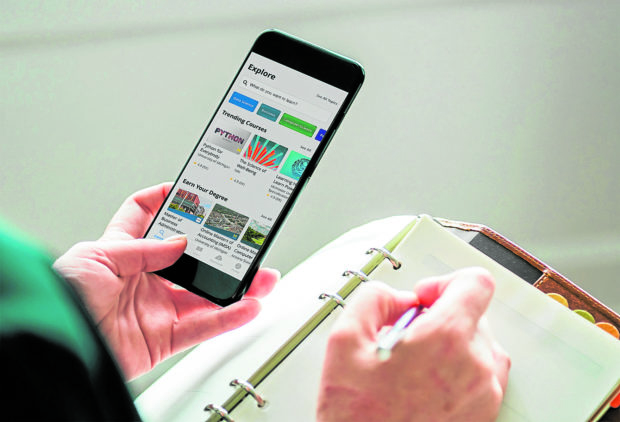Reshaping education amid the pandemic
The education sector is one of the many industries permanently altered by the protracted COVID-19 pandemic. Coursera responded to the sudden need to modify education systems by providing a flexible and inclusive online learning environment, which was widely accepted by people across the globe.
In the Philippines, more than 100,000 new learners were welcomed by Coursera in the first quarter of 2021 alone, bringing the platform’s total Filipino learners to more than 1.1 million, of which 62 percent access lessons through their mobile phones.
In this exclusive interview, Raghav Gupta, managing director for Coursera India and Asia-Pacific, shares more insights into the emerging trends in education and how the industry will continue to be reshaped in the foreseeable future.
What were the challenges faced by the education industry, globally and in the Philippines, last year?
According to the United Nations, the pandemic created the significant disruption of education systems in history. The sudden campus closures pushed universities to use online learning as a way to mitigate impact on students.
However, despite the adoption of online education, challenges continue to exist—limited and unstable internet connectivity, low device penetration and high data costs have been more severe in the Philippines. World Bank data suggests that at least 60 percent of households in the country have limited internet access, and mobile internet speeds are less than half the global average.
Article continues after this advertisementCoursera for Campus allowed educational institutions worldwide and in the Philippines to ensure academic continuity with high-quality learning. It helped universities mitigate the impact of disruptions. In our opinion, the global online learning experiment triggered by the pandemic is going to pave the way for a resilient and future-ready learning ecosystem.
Article continues after this advertisementHow do you think an inclusive online learning environment can be built in the current situation?
Universal connectivity and device access can help build an inclusive education model. The government and the private sectors can come together to ramp up the digital infrastructure. Mobile is a powerful tool in bridging the digital divide. In fact, 61 percent of our learners in the Philippines from last year used mobile devices to access Coursera. The platform allows learners to download courses, synchronize progress and quizzes, take notes with highlights and calendar sync—optimized for low data consumption.
Another driver could be empowering faculties to be able to adapt to the evolving pedagogy and coursework. We share teaching resources to help instructors curate engaging classroom experiences. Based on data across nearly 200 million course enrollments, we also launched the Drivers Quality in Online Learning report which shares insights on what drives a high-quality online learning experience. HEROES 2021 by the Department of Education – Philippines, is another initiative to help teachers understand the new teaching models and focus on high-value teaching.
What is Coursera for Campus and how can it help educational institutions here in the Philippines?
Coursera for Campus is designed to meet the needs of higher education institutions worldwide—helping universities and colleges deliver job-relevant, multidisciplinary learning to their students and faculty, to author and scale for credit online programs. It is intended as an immediate and long-term solution, allowing campuses to swiftly transition online, offering high-quality learning experience without making a significant investment. Through the platform, universities have access to more than 4,200 courses they can seamlessly integrate into their curricula. Coursera for Campus was launched in October 2019, and as of February 2021 has since enrolled over 2.7 million learners globally.
In October last year, we announced long-term, free versions of Coursera for Campus and upgraded features to help address four core needs of universities: delivering academic integrity for credit-bearing online learning, improving student employability, authoring private courses and improving accessibility to students who have limited connectivity and bandwidth. A few key features include automated plagiarism detection with Turnitin, online proctoring with ProctorU and the benefit for faculty to create custom assignments at scale. Coursera for Campus now offers advanced academic integrity features that help empower universities to deliver credit-bearing online learning at scale.
How will the education system look like post-pandemic?
The World Economic Forum (WEF) states that the pandemic has accelerated digital transformation of higher education. We have entered a new era of education where online learning will play a more crucial role in supporting on-campus programs to deliver the critical learning and skills. Along with building digital competencies, universities may start producing digital content for their existing and new course curriculum. Students and professionals will turn to online learning platforms to develop new skills on an ongoing basis. There may be greater acceptance and choice for hands-on learning, skill-based credentials and alternative pathways into degrees. These can be microcredentials that are clearly tied to careers, like the Google IT Support Professional Certificate, which requires no degree and prepares learners for an entry-level IT support role in three to six months.
Globally and in the Philippines, what were the most popular short courses?
Globally, the most popular courses of 2020 highlight that the learners are striving to gain control of their mental health, better understand COVID-19, develop job-relevant skills and pursue personal passions.
The Science of Well-Being – Yale University
Machine Learning – Stanford University
COVID-19 Contact Tracing – Johns Hopkins University
Programming for Everybody (Getting Started with Python) – University of Michigan
Learning How to Learn: Powerful mental tools to help you master tough subjects – University of California San Diego, McMaster University
Students in the Philippines are also learning a variety of topics. The most popular courses on Coursera in the country are:
COVID-19 Contact Tracing – Johns Hopkins University
The Science of Well-Being – Yale University
First Step Korean – Yonsei University
Excel Skills for Business: Essentials – Macquarie University
Write Professional Emails in English – Georgia Institute of Technology
Most popular Guided projects in the Philippines – All by Coursera Project Network
Use WordPress to Create a Blog for your Business
Spreadsheets for Beginners using Google Sheets
Google Ads for Beginners
Use Canva to Create Social Media Marketing Designs
Introduction to Google Docs
What kind of workers/skills are companies looking for, say, in the next five years, that will require additional learning?
As technology evolves rapidly, employers value professionals with new age skills and a strong learning mindset. Professionals equipped with well-balanced and multidisciplinary skill sets will be in demand in the COVID-impacted job environment. The Future of Jobs report by the WEF suggests that the demand for coders, Data Science, AI/ML professionals and app developers is on the rise. In the lead up to 2025, skill groups like critical thinking, analysis, problem-solving and skills in self-management, such as active learning, resilience, stress tolerance and flexibility will be highly sought-after.
The report also states that the double disruption of automation and the pandemic is estimated to displace 85 million jobs by 2025. Among those set to remain in their roles, 50 percent will need reskilling. The increasing automation may also create 97 million new jobs, but the widening skill gaps pose challenges. To thrive in this fast-changing knowledge economy and with remote work as the new norm, we recommend professionals to embrace lifelong learning, adopt a growth mindset and build the critical skills.
What makes Coursera different from the other online educational institutions?
Coursera is uniquely positioned as a global learning platform that is creating new ways for leading universities, companies, governments and learners to reach each other and create value. The platform provides universities with access to more than 82 million learners. Educators can expand the reach of their programs with minimal investment. It frees up universities to focus on their core job of continuously upgrading courses, improving pedagogy, developing new content and delivering impactful learning.
On Coursera, individual courses are the gateway to online degrees. Open courses and projects provide learners an entry point to start their learning journey and work towards valuable credentials. We’ve built a platform designed to give learners broader choice and flexibility to acquire industry-aligned skills and hands-on learning at their own pace. INQ

